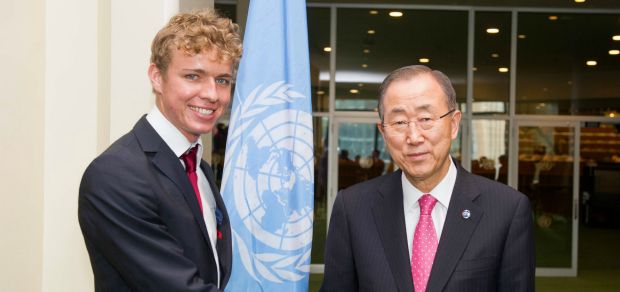An old African proverb says: “If you want to go fast, go alone. If you want to go far, go together”. I believe this wisdom is the key to Sustainable Development.
Over the past years I have talked to thousands of youngsters living in the Netherlands and travelled to all corners of the world. I debated with Dutch students and participated in youth empowerment programs in the slums of Mumbai. I talked to people infected with HIV in Nairobi and worked on rebuilding local fishing communities in the Philippines. Everywhere I went, I came across young people who are already profoundly impacting their societies. My work as a United Nations Youth Delegate is inspired by the stories, challenges, and dreams of these young people, and focuses on putting youth at the centre of the post-2015 development agenda.
Hopefully my colleagues and I can fulfil part of this promise when we will be in New York for the ECOSOC Youth Forum and the Commission for Social Development (CSocD) in February. Youth development lies at the heart of overall development and, with 1.8 billion young people aged 10-24 across the globe, I believe that’s truer today than ever before. At both the ECOSOC Youth Forum and the Commission for Social Development, I am looking forward to discussing topics such as health, governance and employability hand in hand with governments. It is only through working together that we can create solutions that will ensure a truly transformative agenda.
Today we are standing at a cross point in history. If it were up to me, 2015 would be the starting point for a new world. A world in which young people have equal access and opportunities to help shape the future they want. It is time to finally bridge the gap between young people and the United Nations by ensuring meaningful and inclusive youth participation. This means not only communicating with educated youth in capital cities, but also with the marginalized youth who make up the vast majority of young people in the world.
From this perspective, I am thrilled with the post-2015 process so far. For the first time in history, young people have been actively engaged in shaping the development agenda beyond 2015. Take for example, the Global Youth Call that was endorsed by more than 1,300 youth organizations from over 140 Member States and functioned as one of the input documents for the Secretary-General’s synthesis report on the post-2015 development agenda. Despite this, more needs to be done in order for this agenda to be truly inclusive and to ensure that nobody is left behind.
Far away from our realities, far away from New York, there is a world of young people whose voices have never been heard. As a UN Youth Delegate and as a global citizen I feel it is my duty to connect young people from all walks of life with the United Nations. That’s why we, a group of young people, have launched the Building Bridges project. It is a project that will take us on a bicycle from Amsterdam to Cape Town, from the vast desserts of the Sahara to the central highlands of Namibia, from rural communities to crowded metropolises. The goal of this adventurous project is to explore the post-2015 agenda from a different perspective, a youth perspective on the grassroots level. This way we hope to contribute to making this development agenda truly inclusive. Please visit our website or Facebook page for more information on the project.
About the Author:
Jilt van Schayik, aged 23, is the Dutch Youth Delegate to the 69th session UN General Assembly. Jilt studied Business at Fontys University of Applied Science in the Netherlands. For his graduation thesis, Jilt conducted research on agrarian cooperatives in Kenya and established, together with the Kenyan Ministry of Agriculture, a cooperative including 500 farmers.

